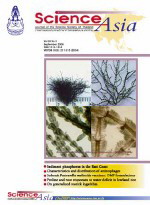ThaiScience
ThaiScience
SCIENCE ASIA
Volume 46, No. 06, Month DECEMBER, Year 2020, Pages 650 - 656
In vitro biological activities of clove essential oil formulations against microsporum gallinae atcc 90749
Jareerat Aiemsaard, Chuchat Kamollerd, Prawit Butudom, Kanlaya Worawong, Eakachai Thongkham
Abstract Download PDF
Avian dermatophytosis is a disease caused by Microsporum gallinae. The disease can cause economic loss in farmed chickens. We investigated the antifungal activity of clove essential oil (CO) against M. gallinae ATCC 90749. The main components of CO were identified by GC-MS, eugenol (98.87%) and trans-caryophyllene (1.13%) were found. The antioxidant activity of CO was determined by DPPH assay, the antioxidation index (AI) ranged from 86.55?0.77 to 92.37?0.25%, which was significantly higher than vitamin E and BHT (p < 0.05). The antifungal activity was determined by broth microdilution method and time-kill kinetics assay. The minimum inhibitory concentration (MIC) and the minimum fungicidal concentration (MFC) of CO against M. gallinae were 0.005 and 0.01% v/v, respectively. Time-kill assay showed that the antifungal activity of CO was dose and time-dependent. The time taken to reduce the number of viable M. gallinae by more than 99.99% was 15 min and 3 h for 2 and 1% v/v CO, respectively. Ointments and cream formulations containing CO were tested for antifungal activity using time-kill kinetics assay. Both the 2 and 4% w/w formulations of the CO ointments and creams reduced the number of viable M. gallinae by more than 99.999% within 15 min. The results of this study show that CO has the potential to be developed as a drug for treating fungal skin diseases in poultry. Further studies on the stability and efficacy of these CO formulations in vivo are needed.
Keywords
clove essential oil, antioxidant, anti-M. gallinae, time-kill assay, ointment and cream formulationsSCIENCE ASIA
Published by : The Science Society of Thailand
Contributions welcome at : http://www.scienceasia.org/
